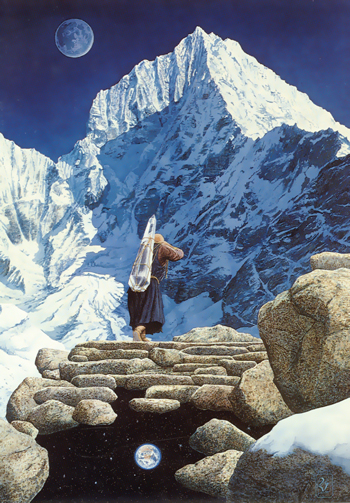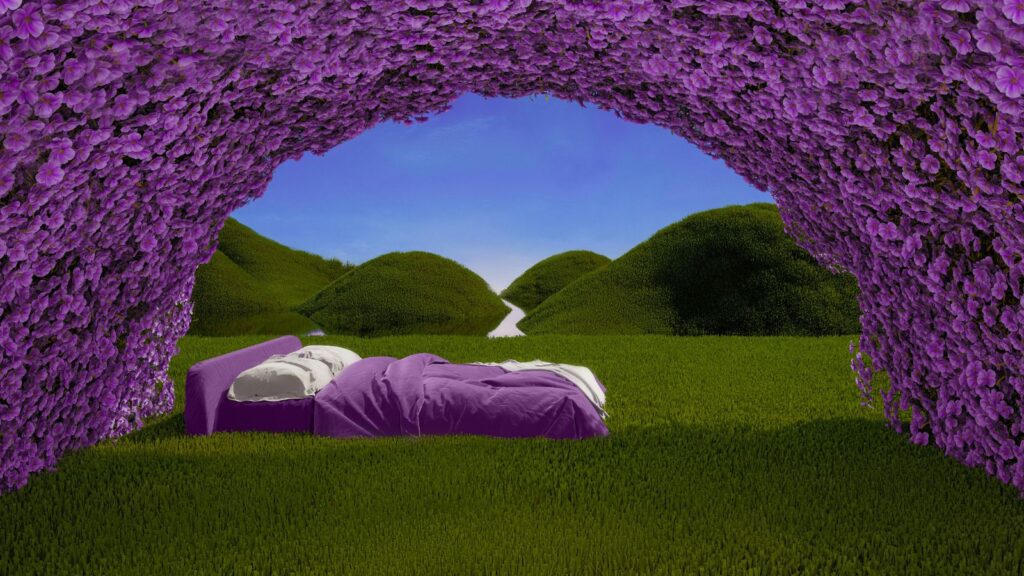More than any other species, human beings are gifted with the power to manipulate their environment and the ability to accumulate and transmit knowledge across generations. The first of these gifts we call technology; the other we call culture. They are central to our humanity.
Accumulating over thousands of years, culture and technology have brought us into a separate human realm. We live, more than any animal, surrounded by our own artifacts. Among these are works of surpassing beauty, complexity, and power: human creations that could not have existed–could not even have been conceived–in the times of our forebears. Seldom do we pause to appreciate the audacity of our achievements: objects as mundane as a compact disc, a video cellphone, an airplane would have seemed fantastical only a few centuries ago. We have created a realm of magic and miracles.
At the same time, it is quite easy to see technology and culture not as a gift but as a curse. After millennia of development, the power to manipulate the environment has become the power to destroy it, while the ability to transmit knowledge transmits as well a legacy of hatred, injustice, and violence. Today, as both the destruction and the violence reach a feverish crescendo, few can deny that the world is in a state of crisis. Opinions vary as to its exact nature: some people say it is primarily ecological; others say it is a moral crisis, a social, economic, or political crisis, a health crisis, even a spiritual crisis. There is, however, little disagreement that the crisis is of human origin. Hence, despair: Is the present ruination of the world built into our humanity?
Is genocide and ecocide the inevitable price of civilization’s magnificence? Need the most sublime achievements of art, music, literature, science, and technology be built upon the wreckage of the natural world and the misery of its inhabitants? Can the microchip come without the oil slick, the strip mine, the toxic waste dump? Under the shadow of every Chartres Cathedral, must there be women burning at the stake? In other words, can the gift of technology and culture somehow be separated from the curse?
The dashed Utopian dreams of the last few centuries leave little hope. Despite the miracles we have produced, people across the ideological spectrum, from Christian fundamentalists to environmental activists, share a foreboding that the world is in grave and growing peril. Temporary, localized improvements cannot hide the ambient wrongness that pervades the warp and woof of modern society, and often our personal lives as well. We might manage each immediate problem and control every foreseeable risk, but an underlying disquiet remains. I am referring simply to the feeling, “Something is wrong around here.” Something so fundamentally wrong that centuries of our best and brightest efforts to create a better world have failed or even backfired. As this realization sinks in, we respond with despair, cynicism, numbness, or detachment.
Yet no matter how complete the despair, no matter how bitter the cynicism, a possibility beckons of a world more beautiful and a life more magnificent than what we know today. Though we may rationalize it, it is not rational. We become aware of it in moments, gaps in the rush and press of modern life. These moments come to us alone in nature, or with a baby, making love, playing with children, caring for a dying person, making music for the sake of music or beauty for the sake of beauty. At such times, a simple and easy joy shows us the futility of the vast, life-consuming program of management and control.
We intuit that something similar is possible collectively. Some of us may have experienced it when we find ourselves cooperating naturally and effortlessly, instruments of a purpose greater than ourselves that, paradoxically, makes us individually more and not less when we abandon ourselves to it. It is what musicians are referring to when they say, “The music played the band.”
Another way of being is possible, and it is right in front of us, closer than close. That much is transparently certain. Yet it slips away so easily that we hardly believe it could be the foundation of life; so we relegate it to an afterlife and call it Heaven, or we relegate it to the future and call it Utopia. (When nanotechnology solves all our problems… when we all learn to be nice to each other… when finally I’m not so busy…) Either way, we set it apart from this world and this life, and thereby deny its practicality and its reality in the here-and-now. Yet the knowledge that life is more than Just This cannot be suppressed, not forever.
What error, then, what delusion has led us to accept the lesser lives and the lesser world we find ourselves in today? What has rendered us helpless to resist the ugliness, pollution, injustice, and downright horror that has risen to engulf the planet in the last few centuries? What calamity has so resigned us to it, that we call this the human condition? Those moments of love, freedom, serenity, play–what power has made us believe these are but respites from real life?
Inspired by such moments, I have spent the last ten years trying to understand what keeps us–and what keeps me–from the better world that our hearts tell us must exist. To my endless amazement, I keep discovering a common root underneath all the diverse crises of the modern age. Underlying the vast swath of ruin our civilization has carved is not human nature, but the opposite: human nature denied. This denial of human nature rests in turn upon an illusion, a misconception of self and world. We have defined ourselves as other than what we are, as discrete subjects separate from each other and separate from the world around us. In a way this is good news. Profound changes will flow, and are already flowing, from the reconception of the self that is underway. The bad news is that our present conception of self is so deeply woven into our civilization–into our technology and culture–that its abandonment can only come with the collapse of much that is familiar. This is what the present convergence of crises portends.
Everything I wrote in the preceding paragraph about our civilization also applies to each of us individually. Saints and mystics have tried for thousands of years to teach us how we are trapped in a delusion about who we are. This delusion inevitably brings about suffering, and eventually a crisis that can only be resolved through a collapse, a surrender, and an opening to a state of being beyond previous self-limitation. The shift in our collective self-conception is intimately related to a parallel shift in our individual self-conception. In other words, there is a spiritual dimension to the planetary crisis.
As this planetary crisis invades our individual lives, unavoidably, neither the personal nor the collective misconception of who we are will remain tenable. Each mirrors the other: in its origin, its consequences, and its resolution. That is why I interweave the story of humanity’s separation from nature with the story of our individual alienation from life, nature, spirit, and self.
* * *
Despite my faith that life is meant to be more, little voices whisper in my ear that I am crazy. Nothing is amiss, they say, this is just the way things are. The rising tide of human misery and ecological destruction, as old as civilization, is simply the human condition, an inevitable result of built-in human flaws like selfishness and laziness. Since you can’t change it, be thankful for your good fortune in avoiding it. The misery of much of the planet is a warning, say the voices, to protect me and mine, impelling me to maximize my security.
Besides, it couldn’t be as bad as I think. If all that stuff were true–about the ecological destruction, the genocide, the starving children, and the whole litany of impending crises–then wouldn’t everyone be in an uproar about it? The normalcy of the routines surrounding me here in America tells me, “It couldn’t be that bad.” That little voice echoes throughout the culture. Every advertising flyer, every celebrity news item, every product catalog, every hyped-up sports event, carries the subtext, “You can afford to care about this.” A man in a burning house wouldn’t care about these things; that our culture does care about them, almost exclusively, implies that our house is not burning down. The forests are not dying. The deserts are not spreading. The atmosphere is not heating. Children are not starving. Torturers are not going free. Whole ethnicities are not being exterminated. These crimes against humanity and crimes against nature couldn’t really be happening. Probably they have been exaggerated; in any event, they are happening somewhere else. Our society will figure out solutions before the calamities of the Third World affect me. See, no one else is worried, are they? Life hums on as usual.
As for my intuition of magnificent possibilities for my own life, well, my expectations are too high. Grow up, the voices say, life is just like this. What right have I to expect the unreasonable magnificence certain moments have shown me? No, it is my intuitions that are not to be trusted. The examples of what life is surround me and define what is normal. Do I see anyone around me whose work is their joy, whose time is their own, whose relationships are forever passionate? It can’t happen. So, say the voices, look after your own security, control the pain, and find new and better entertainment to keep life’s tedium at bay. Let good enough be good enough. Listening to these voices, is it any wonder that for many years, I devoted most of my energy and vitality to the escapes from life? Is it any wonder that so many college students look forward already, at age 21, to retirement?
If life and the world are Just This, we are left no choice but to make the best of it: to be more efficient, to achieve better security, to get life’s uncertainties under control. There are voices that speak to this too. They are the evangelists of technology and self-improvement, who urge us to improve the human condition basically by trying harder. My inner evangelist tells me to get my life under control, to work out every day, to organize my time more efficiently, to watch my diet, to be more disciplined, to try harder to be a good person. On the collective level, the same attitude says that perhaps the next generation of material and social technologies–new medicines, better laws, faster computers, solar power, nanotechnology–will finally succeed in improving our lot. We will be more efficient, more intelligent, more capable, and finally have the capacity to solve humanity’s age-old problems.
For more and more people today, these voices ring hollow. Words like “high-tech” and “modern” lose their cachet as a multiplicity of crises converge upon our planet. If we are fortunate, we might, for a time, prevent these crises from invading our personal lives. Yet as the environment continues to deteriorate, as job security evaporates, as the international situation worsens, as new incurable diseases appear, as the pace of change accelerates, it seems impossible to rest at ease. The world grows more competitive, more dangerous, less hospitable to easy living, and security comes with greater and greater effort. And even when temporary security is won, a latent anxiety lurks within the fortress walls, a mute unease in the background of modern life. It pervades technological society, and only intensifies as the pace of technology quickens. We begin to grow hopeless as our solutions–new technologies, new laws, more education, trying harder–only seem to worsen our problems. For many activists, hopelessness gives way to despair as catastrophe looms ever closer despite their best efforts.
In the following series of essays, I will explain why trying harder can never work. Our “best efforts” are grounded in the same mode of being that is responsible for the crisis in the first place. As Audre Lord put it, “The master’s tools will never dismantle the master’s house.” Soon, though, this mode of being will come to an end, to be replaced by a profoundly different sense of the self, and a profoundly different relationship between human and nature. I will describe a gathering revolution in human beingness.
This revolution is not just a personal or even a social phenomenon. A change in our sense of self implies a change in our sense of world too–a change in what we consider real or possible. In researching The Ascent of Humanity I visited the darkest despair, as I realized the true magnitude of the crises on hand. What the doomsayers say is true: our situation is beyond hope. Perhaps if we had reversed course in the 1960’s, if we had zealously applied all the ecological and social understandings that arose at that time, there would still have been hope. No longer. It is too late. Only a miracle will save us. And so I say, “Let us devote ourselves to the study of miracles.”
And what is a miracle? A miracle is an occurrence from beyond our world–beyond, that is, the reality we know. A miracle is an expansion of the Possible. Miracles abound today, crowding at the gates of the realm of objectivity and reason we have created. We hold them back with increasing difficulty, all those things which simply don’t fit into the conventional worldview. They point to the technologies of a new world, but they are not really new technologies, new techniques for extending our domination of nature. They are, rather, a wholly new (and very ancient) mode of technology. They spring from a profoundly different understanding of self and world, and they will therefore remain marginal, “alternative”, until the world we know today has collapsed.
We can see this collapse, then, as a birthing process. The old world dissolves, and a series of intense contractions births us into a new world. We are being pushed into the light.
Even in the darkest days, everyone senses a higher possibility, a world that was meant to be, life as we were meant to live it. Glimpses of this world of wholeness and beauty have inspired idealists for thousands of years, and echo in our collective psyche as notions of Heaven, an Age of Aquarius, or Eden: a once and future Golden Age. As mystics have taught throughout the ages, such a world is closer than close, “within us and among us”. Yet as well it is impossibly far off, forever inaccessible to any effort arising from our present self-conception. To reach it, our present self-conception and the relationship to the world it implies must collapse, so that we might discover our true selves, and therefore our true role, function, and relationship to the universe.
I will not offer merely another critique of modern society, and the solutions I explore are not along the lines of “we should do this” and “we shouldn’t do that.” Who the hell is “we”? You and I are just you and I. That is why so much political discourse (about what “we” must do) is so disheartening; that is why so many activists experience such despair, such despondency. You and I, no matter how much we agree with each other, are not the “we” of collective action, as in “we need to live more sustainably” or “we need to pursue diplomatic options.” I find many people resonating with my intuition of a wrongness about life and the world as we know it, but their response is not empowered indignation, it is despair, helplessness, impotence. What can one person do? These emotions too are symptoms of the same separation behind all of our crises. When I am a discrete and separate individual, whatever I do makes little difference. But this logic is founded upon an illusion. We–you and I–are actually powerful beyond imagining.
Have you ever found yourself shifting back and forth between an exalted optimism that a great change is gathering, and a dark despair that denies any plausible future but a continuing downward spiral of ruin? If so, you too are in the midst of a revolution.
In coming months I will offer a series of essays on this website, drawing from my 2007 book The Ascent of Humanity as well as new material, and dedicated to accelerating the revolution in human beingness. They will explore the central themes of The Ascent of Humanity: the origins, expression, and purpose of the great Age of Separation that is culminating in our time; the crises it has engendered, and the Age of Reunion to which it is giving birth. Or, to put it more directly, they will assay the realm of despair in order to reach the light beckoning beyond it. Such an assay is necessary, for as the saying goes, “The only way out is through.” What optimism can be authentic, if it has not integrated the full depth and breadth of despair? Optimism that ignores ugly realities inevitably bears its opposite. The time has come to get real.
Charles Eisenstein is a speaker and the author of The Ascent of Humanity and other books.















